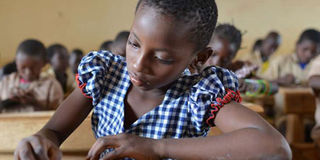It's a pity we expect a lot from children but do little as adults

A pupil in a classroom. Per the Children’s Act, a Kenyan child has a responsibility to “work for the cohesion of the family.” AFP PHOTO | ISSOUF SANOGO
What you need to know:
Let's be realistic: Until such a time when the nation has achieved national solidarity among adults, then the same can be called upon from children.
- Our elected leaders don't even come close to this; their political parties lack solidarity. Arms of government lack solidarity. Do we really expect children to do what our leaders cannot?
I feel I must warn you: Your child has legal duties and responsibilities even if they are only a day old! If we are to comply with this law, then the government should consider bundling relevant leaflets alongside birth certificates.
Per the Children’s Act, a Kenyan child has a responsibility to “work for the cohesion of the family.” Does a three-year-old know what “cohesion” means? And do our teenagers care? How are they expected to maintain family unity? It's unconscionable to place this level of emotional responsibility on a child whose biggest concern is — and should remain — what time the school lunchtime bell rings.
RESPECT
The next duty draws inspiration from the 10 Commandments: “A child has a duty to respect his parents, superiors and elders, at all times and assist them. This provision is not particularly gender inclusive. In this progressive feminist world, a revision would suffice. Nonetheless, is there mutual respect expected between children and the listed groups or it is a one-way exchange? While I agree children should accord respect, there are instances where children are not recognised as fellow human beings let alone respected. We have heard of children beaten by their superiors to a pulp and hospitalised, in the name of instilling discipline and respect. Other children have been emotionally terrorised or neglected by those they should be respecting. It is phoney to then expect children to be of assistance to the same groups of people thereafter. Of course, where a child shows total lack of respect, the law and its consequences should suffice. But if adults are falling short of this responsibility, how do we expect our children to comply?
One responsibility stands out as a positive challenge: Children have a duty to serve their national community by placing their physical and intellectual abilities at its service. Hands up if you've done this as a child. Many hands are probably going up in Iten where junior athletes place their bodies at the service of Kenya. We can’t all be athletes, but children can certainly excel in arts or STEM. Two years ago, five girls from Kisumu Girls’ High School developed the ‘I-cut’ app to combat FGM. If you are a child reading this in your school library, at home or the local clinic, it's not too late to serve your country even if it’s just helping an older person cross the road. After all, they are part of the national community.
CANVASSING
But don't get too bogged down serving the national community; you are also expected to preserve and strengthen social and national solidarity. I read this provision and couldn’t help but chuckle at its irony. Our elected leaders don't even come close to this; their political parties lack solidarity. County assemblies lack solidarity. Arms of government lack solidarity. Do we really expect children to do what our leaders cannot?
How is a child expected to uphold national solidarity? Should they go around canvassing the neighbourhood checking for solidarity? If they find solidarity lacking, do they summon a chama of the adults to call for social and national solidarity?
Socially speaking, you only have to wander around Twitter for a few minutes to witness our utter lack of social solidarity. Is a child expected to contain this chaos? Self proclaimed Twitter police have a hard time finding a consensus; what are a child’s chances? Let's be realistic: Until such a time when the nation has achieved national solidarity among adults, then the same can be called upon from children.
RESOLVED
Finally, children must fulfil their duty to preserve and strengthen the positive cultural values of their community in their relations with other members of that community. I wholly agree with this final provision; I believe children do not have to uphold negative cultural values.
If the provision went further to include negative cultural practices, battling FGM and childhood marriage would be halfway resolved. But maybe this is wishful thinking, considering a child must know the provision exists in order to compel their community to uphold it. And how often does a child have a voice in the community? Never!
It, therefore, makes it difficult to understand how a child can ever fulfil these duties and responsibilities in their entirety.




